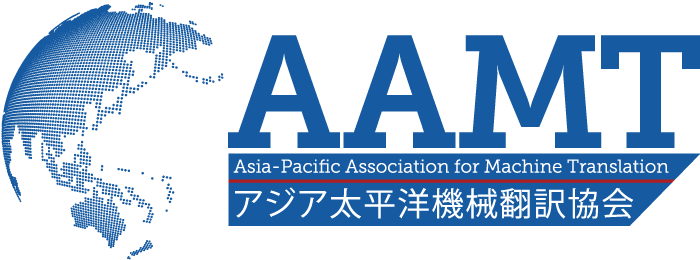Many Asian countries are rapidly growing these days and the importance of communicating and exchanging the information with these countries has intensified. To satisfy the demand for communication among these countries, machine translation technology is essential.
Machine translation technology has rapidly evolved recently and it is seeing practical use especially between European languages. However, the translation quality of Asian languages is not that high compared to that of European languages, and machine translation technology for these languages has not reached a stage of proliferation yet. This is not only due to the lack of the language resources for Asian languages but also due to the lack of techniques to correctly transfer the meaning of sentences from/to Asian languages. Consequently, a place for gathering and sharing the resources and knowledge about Asian language translation is necessary to enhance machine translation research for Asian languages.
The Workshop on Machine Translation (WMT), the world's largest machine translation workshop, mainly targets on European languages and does not include Asian languages. The International Workshop on Spoken Language Translation (IWSLT) has spoken language translation tasks for some Asian languages using TED talk data, but these is no task for written language.
The Workshop on Asian Translation (WAT) is an open machine translation evaluation campaign focusing on Asian languages. WAT gathers and shares the resources and knowledge of Asian language translation to understand the problems to be solved for the practical use of machine translation technologies among all Asian countries. WAT is unique in that it is an "open innovation platform": the test data is fixed and open, so participants can repeat evaluations on the same data and confirm changes in translation accuracy over time. WAT has no deadline for the automatic translation quality evaluation (continuous evaluation), so participants can submit translation results at any time.
In addition to the shared tasks, the workshop will also feature scientific papers on topics related to the machine translation, especially for Asian languages.
Topics of interest include, but are not limited to:
 |
AAMT |
 |
SunFlare Co., Ltd. |
| Translation Task Submission Deadline | September 18, 2020 (EXTENDED!!) | |
| Research Paper Submission Deadline | September 18, 2020 | |
| System Description Paper Submission Deadline | October 23, 2020 | |
| Notification of Acceptance for Research Papers | October 23, 2020 | |
| Review Feedback of System Description Papers | October 30, 2020 | |
| Camera-ready Deadline (both Research and System Description Papers) | November 6, 2020 | |
| Workshop Dates | December 4, 2020 Workshop Dates |
| 10:00 - 10:05 | Welcome |
| 10:05 - 11:05 | Research Paper I |
| 10:05 - 10:25 : An Effective Optimization Method for Neural Machine Translation: The Case of English-Persian Bilingually Low-Resource Scenario | |
| Benyamin Ahmadnia and Bonnie Dorr | |
| 10:25 - 10:45 : Transformer-based Double-token Bidirectional Autoregressive Decoding in Neural Machine Translation | |
| Kenji Imamura and Eiichiro Sumita | |
| 10:45 - 11:05 : Translation of New Named Entities from English to Chinese | |
| Zizheng Zhang, Tosho Hirasawa, Wei Houjing, Masahiro Kaneko and Mamoru Komachi | |
| 11:05 - 11:10 | Short Break |
| 11:10 - 12:00 | Shared Task I - ASPEC / JIJI / Multimodal En-Ja |
| 11:10 - 11:24 : Task Descriptions and Results | |
| Toshiaki Nakazawa, Isao Goto and Hideki Nakayama | |
| 11:24 - 11:36 : Meta Ensemble for Japanese-Chinese Neural Machine Translation: Kyoto-U+ECNU Participation to WAT 2020 | |
| Zhuoyuan Mao, Yibin Shen, Chenhui Chu, Sadao Kurohashi and Cheqing Jin | |
| 11:36 - 11:48 : Neural Machine Translation Using Extracted Context based on Deep Analysis for the Japanese-English Newswire Task at WAT 2020 | |
| Isao Goto, Hideya Mino, Hitoshi Ito, Kazutaka Kinugawa, Ichiro Yamada and Hideki Tanaka | |
| 11:48 - 12:00 : TMU Japanese-English Multimodal Machine Translation System for WAT 2020 | |
| Hiroto Tamura, Tosho Hirasawa, Masahiro Kaneko and Mamoru Komachi | |
| 12:00 - 14:00 | Lunch Break |
| 14:00 - 15:39 | Shared Task II - Indic Multilingual / UFAL EnOdia / Multimodal En-Hi / Hinden |
| 14:00 - 14:15 : Task Descriptions and Results | |
| Raj Dabre and Shantipriya Parida | |
| 14:15 - 14:27 : HW-TSC's Participation in the WAT 2020 Indic Languages Multilingual Task | |
| Zhengzhe Yu, Zhanglin Wu, Xiaoyu Chen, Daimeng Wei, Hengchao Shang, Jiaxin Guo, Zongyao Li, Minghan Wang, Liangyou Li, Lizhi Lei, Hao Yang and Ying Qin | |
| 14:27 - 14:39 : NICT's Submission To WAT 2020: How Effective Are Simple Many-To-Many Neural Machine Translation Models? | |
| Raj Dabre and Abhisek Chakrabarty | |
| 14:39 - 14:51 : ODIANLP's Participation in WAT2020 | |
| Shantipriya Parida, Petr Motlicek, Amulya Ratna Dash, Satya Ranjan Dash, Debasish Kumar Mallick, Satya Prakash Biswal, Priyanka Pattnaik, Biranchi Narayan Nayak and Ondřej Bojar | |
| 14:51 - 15:03 : Multimodal Neural Machine Translation for English to Hindi | |
| Sahinur Rahman Laskar, Abdullah Faiz Ur Rahman Khilji, Partha Pakray and Sivaji Bandyopadhyay | |
| 15:03 - 15:15 : The ADAPT Centre's Participation in WAT 2020 English-to-Odia Translation Task | |
| Prashanth Nayak, Rejwanul Haque and Andy Way | |
| 15:15 - 15:27 : NLPRL Odia-English: Indic Language Neural Machine Translation System | |
| Rupjyoti Baruah and Rajesh Kumar Mundotiya | |
| 15:27 - 15:39 : WT: Wipro AI Submissions to the WAT 2020 | |
| Santanu Pal | |
| 15:39 - 15:45 | Short Break |
| 15:45 - 16:55 | Shared Task III - JPC / BSD |
| 15:45 - 15:55 : Task Descriptions and Results | |
| Chenchen Ding and Toshiaki Nakazawa | |
| 15:55 - 16:07 : Korean to Japanese Neural Machine Translation System using Hanja Information | |
| Hwichan Kim, Tosho Hirasawa and Mamoru Komachi | |
| 16:07 - 16:19 : Goku's Participation in WAT 2020 | |
| Dongzhe Wang and Ohnmar Htun | |
| 16:19 - 16:31 : The ADAPT Centre's Neural MT Systems for the WAT 2020 Document-Level Translation Task | |
| Wandri Jooste, Rejwanul Haque and Andy Way | |
| 16:31 - 16:43 : The University of Tokyo's Submissions to the WAT 2020 Shared Task | |
| Matīss Rikters, Toshiaki Nakazawa and Ryokan Ri | |
| 16:43 - 16:55 : Improving NMT via Filtered Back Translation | |
| Nikhil Jaiswal, Mayur Patidar, Surabhi Kumari, Manasi Patwardhan, Shirish Karande, Puneet Agarwal and Lovekesh Vig | |
| 16:55 - 17:00 | Short Break |
| 17:00 - 18:00 | Research Paper II |
| 17:00 - 17:20 : A parallel evaluation data set of software documentation with document structure annotation | |
| Bianka Buschbeck and Miriam Exel | |
| 17:20 - 17:40 : Inference-only sub-character decomposition improves translation of unseen logographic characters | |
| Danielle Saunders, Weston Feely and Bill Byrne | |
| 17:40 - 18:00 : An Error-based Investigation of Statistical and Neural Machine Translation Performance on Hindi-to-Tamil and English-to-Tamil | |
| Akshai Ramesh, Venkatesh Balavadhani Parthasa, Rejwanul Haque and Andy Way | |
| 18:00 | Closing |
Tasks:
Dataset:
Baseline system:
Baseline systems site is now open.
We will evaluate the translation performance of the results submitted through
automatic evaluation and human evaluation.
Automatic evaluation:
We will prepare an automatic evaluation server.
You will be able to evaluate the translation results at any time using this server.
Human evaluation:
Human evaluation will be carried out with two kinds of method,
which are Pairwise Crowdsourcing Evaluation and JPO Adequacy Evaluation.
Submission:
Submission site is now open.
(User Name and Password is necessary to access.)
Evaluation results:
Evaluation results site is now open.
Participants who submit results for human evaluation are required to submit description papers of their translation systems and evaluation results. All submissions and feedback are handled electronically as below.
The application site
for task participants of WAT2020 is now open.
For questions, comments, etc. please email to "wat-organizer -at- googlegroups -dot- com".
Japan Patent Office
The Association for Natural Language Processing
National Institute of Information and Communications Technology (NICT)
Asia-Pacific Association for Machine Translation (AAMT)
2020-07-08: registration page etc. opened
2020-02-01: site opened
NICT (National Institute of Information and Communications Technology)
Kyoto University
Last Modified: 2020-07-08